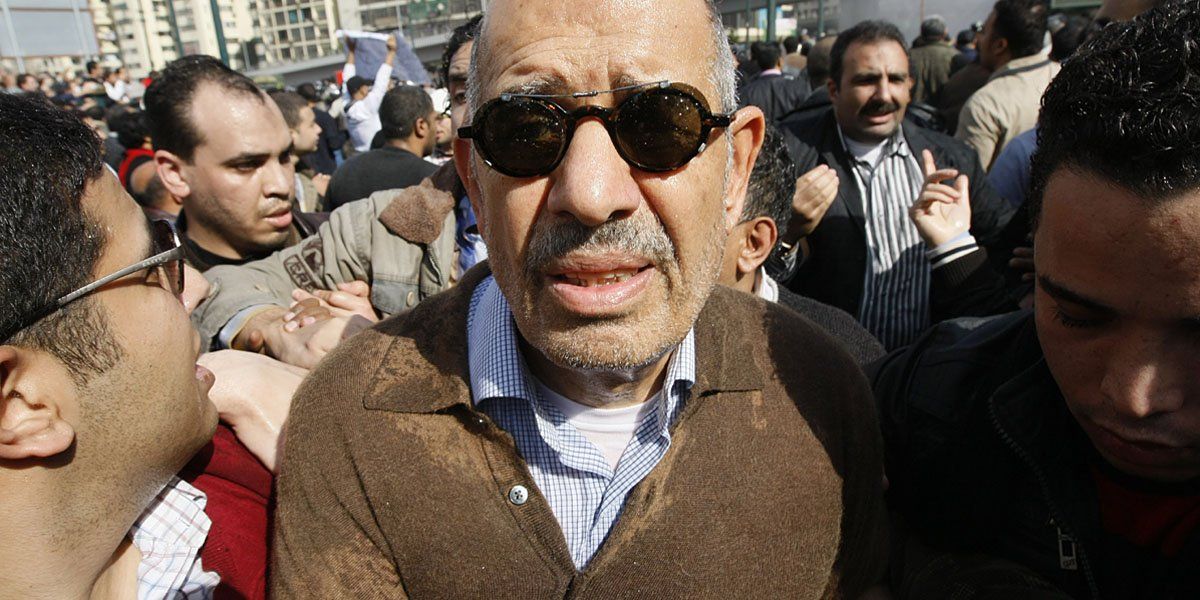
Egyptian police used water cannons against Nobel laureate and pro-democracy leader Mohamed ElBaradei and his supporters as anti-Mubarak protests heated up Friday. Then ElBaradei was put under house arrest as riot police used tear gas and rubber bullets on protesters. The Muslim Brotherhood says at least five of its leaders and five former members of parliament have been arrested. Opposition groups say the new round of protests may make or break the movement to end President Hosni Mubarak's 30-year rule. As tens of thousands demonstrated after prayers, the government shut down the Internet and cellphone text-messaging, as well as Cairo's subway system. "It's over, I think, for the Mubarak regime," said Maha Azzam of the think-tank Chatham House. The U.S. State Department, which has held back on outright criticism of the clampdown, said it was "concerned" about the blocking of communications services—it issued the statement via Twitter.
When 29-year-old Dalia Ziada, a popular Egyptian blogger, took to the streets of Cairo to protest this week, she saw an astonishing sight: In the crowds were university students and mothers with families in tow—a diverse mix of women marching and chanting, and running from the police.
During Friday's mass demonstrations, women also participated, vocally and visibly, in what became a brutal standoff with authorities. (Police reportedly used tear-gas, rubber-bullets and water-cannon against the protesters.)
"Men and women are standing side-by-side in calling for their rights," said Ziada in a telephone interview, before the government cut all cell phone connections.
Esraa Abdel Fatah, who also protested in Cairo this week, and who is known as "Facebook Girl" after organizing a nation-wide strike through her page in 2008, had a similar take: "We're all Egyptians."
This air of inclusiveness has surrounded Egypt's upheaval from the start, with protesters highlighting the movement's "purity" and lack of religious or political agenda beyond democratic reform. Women, who in Cairo are often groped in the streets, report that other demonstrators have been remarkably respectful.
Sara Abu Bakr, a journalist and publisher in Cairo, was surprised by the lack of sexual harassment, for which Egypt is infamous, especially during large public events. "This was supposed to be sexual molestation day, and nothing happened," she said. Several activists in Cairo reported the same.
On the street and online, "Purity"—be it political or sexual—has become a rallying cry.
"You don't see political flags [in the crowds]," said Ahmed Samih, an activist who directs an Internet radio station in Cairo. "You don't see the Muslim Brotherhood. You see Egyptians. You see the flags of Egyptians all over the place."
Or as Ziada put it: "All you have is an idea."
Some observers, however, worried that the government might employ professional rabble-rousers to specifically target women. Whether Friday's government crackdown took aim at women in particular was hard to assess since the government cut Internet access as well cell phone communication.
But it was clear that the standoff was violent and chaotic.
There were reports that police used water cannons on Nobel Peace Prize winner Mohamed ElBaradei, a pro-democracy leader and President Hosni Mubarak's top adversary, during Friday's protests. He had returned to Cairo earlier in the week to demand reform.
The Muslim Brotherhood, which until this week was seen as the only force capable of bringing big numbers to the streets, officially endorsed the demonstration after staying on the sidelines for much of the week.
"No political force is in the position to claim this. It's coming from the people," says Wael Khalil, a veteran activist in Cairo. "The Tunisian people stood their ground and defied the brute force together. And I think Egyptians…are out to outdo the Tunisians in taking matters into our own hands."
This article originally appeared on The Daily Beast.
Uncommon Knowledge
Newsweek is committed to challenging conventional wisdom and finding connections in the search for common ground.
Newsweek is committed to challenging conventional wisdom and finding connections in the search for common ground.





